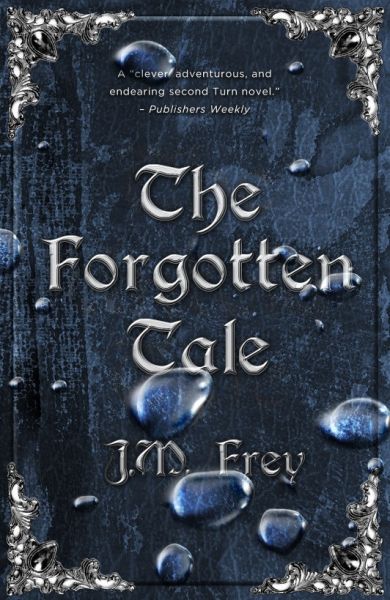Don’t Have Nobody to Call My Own
The Forgotten Tale (Accidental Turn, volume 2)
By J. M. Frey

10 Nov, 2017
The Forgotten Tale is the second volume in J. M. Frey’s Accidental Turn series.
Once a supporting character in Elgar Reed’s deplorably written but popular fantasy series, spymaster Forsyth Turn escaped with his beloved Pip to Pip’s native Canada (which, as we all know, is nearly as happy as Denmark). Content in his new life, husband to Pip, father to Alis, Forsyth has no intention of returning to his native Hain or even of maintaining contact with Reed.
Alas, just because he is done with fantastic adventures in Reed’s poorly – thought-out land does not mean that Hain is done with Forsyth. Or with Forsyth’s family.
Enslaved for decades by a lustful human, the Deal-Maker Spirit is determined to use her hard-won freedom to reunite with her long lost son. Inexplicably, he is nowhere to be found, not in any of the realms the Deal-Maker can reach. Failure only hardens her resolve.
Meanwhile, in the mundane world, Forsyth notes with alarm that well-known works of fantasy are slowly vanishing from public consciousness. The how and why of the disappearances are not exactly obvious, but Forsyth fears that he himself may be to blame, that somehow his journey from the world of imagination to the real world is having terrible effects on reality.
Thanks to the poor judgment of Wyndham, a nephew Forsyth has yet to meet, Forsyth will have the chance to learn what exactly is going on. He Pip and Alis will be snatched from Canada and returned to Hain, a realm designed to give his heroic older brother Kintyre glorious glorious adventures. Author-mandated adventures that take no account of the consequent damages to innocent bystanders, friends, family, and especially not to people like Pip and Alis …
~oOo~
Reed’s little world may be enticing but it’s also badly written. Reed’s blind spots, and the horrible events he has casually imagined in order to drive the story, result in all sorts of unintended consequences (that is, when the plot plays out regardless of authorial whim). This conceit lets Frey critique various genre tropes, many involving fridging the female characters. Of course that requires Frey to create a secondary world that is just chockful of the tropes the author decries!
To quote a noted pundit:
Sideshow Bob: By the way, I’m aware of the irony of appearing on TV in order to decry it, so don’t bother pointing that out.
This is not an author becoming that which they decry. Frey is conscious of what she is doing. She even lampshades it in several places.
The real villain of the piece is Elgar Reed, the author of the stories within the story, the person on whose shoulders every tragedy and crime in the series may be laid. Sadly, the worst he suffers is the occasional verbal chastisement; he is beyond the reach of anything in his narrative universe, at least so far. One can hope that book three of this series depicts an author pulled into his fictional world and being eaten by a grue — or better yet, a ravening gazebo.
Competently written, The Forgotten Tale can stand on its own, but is better read as part of an ongoing series.
The Forgotten Tale is available here (Amazon) and here (Chapters-Indigo).
